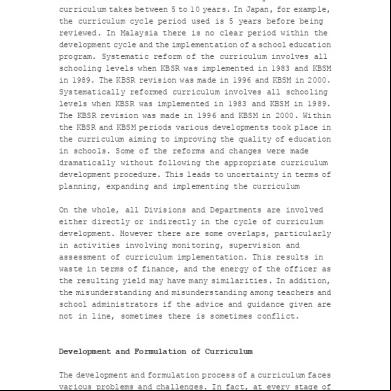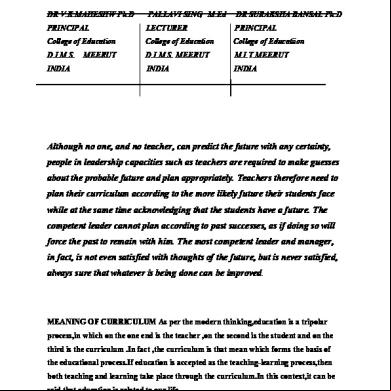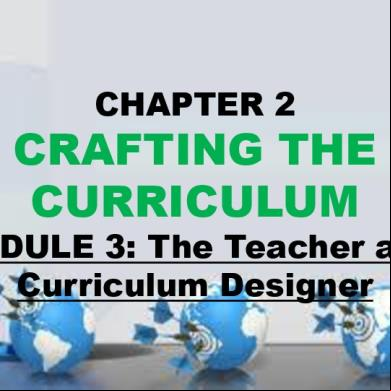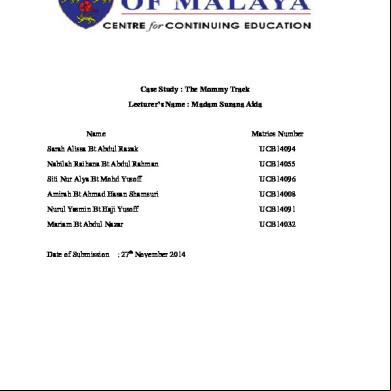Model Of Curriculum Development 2s481w
This document was ed by and they confirmed that they have the permission to share it. If you are author or own the copyright of this book, please report to us by using this report form. Report 2z6p3t
Overview 5o1f4z
& View Model Of Curriculum Development as PDF for free.
More details 6z3438
- Words: 1,052
- Pages: 28
Curriculum Development & Models DED 0122: Curriculum & Teaching Course Instructor Said A.S.Yunus 09/09/15
DED 0122: CURRICULUM & TEACHING
1
Objectives At the end of this lecture, student
should be able to: 1. Define curriculum development 2. Define the concept of model 3. Identify types of curriculum development models
09/09/15
DED 0122: CURRICULUM & TEACHING
2
What is curriculum development? Curriculum development is the
organized preparation of whatever is going to be taught in schools at a given time in a given year. They are made into official documents, as guides for teachers, and made obligatory by provincial and territorial departments 09/09/15
DED 0122: CURRICULUM & TEACHING
3
What is curriculum development? Curriculum Development can be defined
as the systematic planning of what is taught and learned in schools as reflected in courses of study and school programs. These curricula are embodied in official documents (typically curriculum "guides" for teachers) and made mandatory by provincial and territorial departments of education 09/09/15
DED 0122: CURRICULUM & TEACHING
4
What is curriculum development? Curriculum development is the process
of setting up and establishing specific guidelines of instruction for the curriculum.
09/09/15
DED 0122: CURRICULUM & TEACHING
5
The Curriculum: models
09/09/15
DED 0122: CURRICULUM & TEACHING
6
Curriculum models Model: Definition: A simplified representation of reality which is often depicted in diagrammatic form
09/09/15
DED 0122: CURRICULUM & TEACHING
7
Curriculum models Model: Purpose: To provide a structure for examining the elements that go to make up curriculum planning, and how these elements interrelate. 09/09/15
DED 0122: CURRICULUM & TEACHING
8
Curriculum models Model: The literature in the area of curriculum has accepted the use of the term ‘model’ to explain both the nature and the process of curriculum development.
09/09/15
DED 0122: CURRICULUM & TEACHING
9
Curriculum models Models are used to explain: levels of curriculum aspects of organization practice aspects of classroom instruction types of decision making 09/09/15
DED 0122: CURRICULUM & TEACHING
10
Curriculum models Are designed to provide a basis for decisions regarding the selection, structuring and sequencing of the educational experiences
09/09/15
DED 0122: CURRICULUM & TEACHING
11
The curriculum process The development of a curriculum involves
the developer in decisions about the nature and appropriateness of the substantive (basic) elements, e.g. the Outcomes Content method assessment strategies These decisions are made in relation to the context in which the curriculum will operate. 09/09/15
DED 0122: CURRICULUM & TEACHING
12
Types of curriculum models Rational/objectives
models
Cyclical
models Dynamic/interaction models
09/09/15
DED 0122: CURRICULUM & TEACHING
13
A continuum of curriculum models Rational/objectives models: Ralph Tyler Hilda Taba
09/09/15
DED 0122: CURRICULUM & TEACHING
14
A continuum of curriculum models Cyclical models: Wheeler Nichols
09/09/15
DED 0122: CURRICULUM & TEACHING
15
A continuum of curriculum models Dynamic/interaction models : Walker Skilbeck
09/09/15
DED 0122: CURRICULUM & TEACHING
16
Ralph Tyler's Model/Rationale Ralph Tyler considered four
considerations in curriculum development: 1. purposes of the school 2. educational experiences related to the purposes 3. organization of the experiences 4. evaluation of the experiences
09/09/15
DED 0122: CURRICULUM & TEACHING
17
09/09/15
DED 0122: CURRICULUM & TEACHING
18
Hilda Taba's Linear Model Hilda Taba believed that teachers who
teach or implement the curriculum should participate in developing it. Her advocacy was commonly called the "grassroots approach" where teachers could have a major input. She presented seven major steps:
09/09/15
DED 0122: CURRICULUM & TEACHING
19
Hilda Taba's Linear Model 1. Diagnosis of needs. The teacher
(curriculum designer) starts the process by identifying the needs of the students for whom the curriculum is to be planned 2. Formulation of learning objectives. After the teacher has identified the needs that require attention, he or she specifies objectives to be accomplished.
09/09/15
DED 0122: CURRICULUM & TEACHING
20
Hilda Taba's Linear Model 3. Selection of learning content. The objectives selected
or created suggest the subject matter or content of the curriculum. Not only should objectives and content match but also the validity and significance of the content chosen needs to be determined. 4. Organization of learning content. A teacher can not just select content, but must organize it in some type of sequence, taking into consideration the maturity of the learners, their academic achievement, and their interests. .
09/09/15
DED 0122: CURRICULUM & TEACHING
21
Hilda Taba's Linear Model 5. Selection of learning experiences. Content must be
presented to pupils and pupils must engage the content. At this point, the teacher select instructional methods that will involve students with the content. 6. Organization of learning activities. Just as content must be sequenced and organized, so must the learning activities. Often the sequence of the learning activities is determined by the content. But the teacher needs to keep in mind the particular students whom he or she will be teaching.
09/09/15
DED 0122: CURRICULUM & TEACHING
22
Hilda Taba's Linear Model 7. Evaluation and means of evaluation.
The curriculum planner must determine just what objectives have been accomplished. Evaluation procedures need to be considered by the students and teachers.
09/09/15
DED 0122: CURRICULUM & TEACHING
23
Curriculum Development Some curriculum
experts like Tyler say that the steps are followed in a sequence or a straight line. This model that assumes that curriculum decision making follows a straight line is called linear model 09/09/15
DED 0122: CURRICULUM & TEACHING
24
Curriculum Development Other scholars argue that
curriculum decision making is not a simple linear process that necessarily starts with aims. One of them is Wheeler (1978) who believes that curriculum decision making can start from any point and can come back to any of the points e.g. like a cycle 09/09/15
DED 0122: CURRICULUM & TEACHING
25
Curriculum Development Kerr (1968) also
09/09/15
believes that curriculum process is a very complex set of activities and decisions and they interact a lot. Changes made in content may necessitate changes in experiences, which may again bring about changes in evaluation etc. DED 0122: CURRICULUM & TEACHING
26
Evaluation What was useful? What was not so useful? What needs to be Changed?
09/09/15
DED 0122: CURRICULUM & TEACHING
27
THANK YOU FOR LISTENING
09/09/15
DED 0122: CURRICULUM & TEACHING
28
DED 0122: CURRICULUM & TEACHING
1
Objectives At the end of this lecture, student
should be able to: 1. Define curriculum development 2. Define the concept of model 3. Identify types of curriculum development models
09/09/15
DED 0122: CURRICULUM & TEACHING
2
What is curriculum development? Curriculum development is the
organized preparation of whatever is going to be taught in schools at a given time in a given year. They are made into official documents, as guides for teachers, and made obligatory by provincial and territorial departments 09/09/15
DED 0122: CURRICULUM & TEACHING
3
What is curriculum development? Curriculum Development can be defined
as the systematic planning of what is taught and learned in schools as reflected in courses of study and school programs. These curricula are embodied in official documents (typically curriculum "guides" for teachers) and made mandatory by provincial and territorial departments of education 09/09/15
DED 0122: CURRICULUM & TEACHING
4
What is curriculum development? Curriculum development is the process
of setting up and establishing specific guidelines of instruction for the curriculum.
09/09/15
DED 0122: CURRICULUM & TEACHING
5
The Curriculum: models
09/09/15
DED 0122: CURRICULUM & TEACHING
6
Curriculum models Model: Definition: A simplified representation of reality which is often depicted in diagrammatic form
09/09/15
DED 0122: CURRICULUM & TEACHING
7
Curriculum models Model: Purpose: To provide a structure for examining the elements that go to make up curriculum planning, and how these elements interrelate. 09/09/15
DED 0122: CURRICULUM & TEACHING
8
Curriculum models Model: The literature in the area of curriculum has accepted the use of the term ‘model’ to explain both the nature and the process of curriculum development.
09/09/15
DED 0122: CURRICULUM & TEACHING
9
Curriculum models Models are used to explain: levels of curriculum aspects of organization practice aspects of classroom instruction types of decision making 09/09/15
DED 0122: CURRICULUM & TEACHING
10
Curriculum models Are designed to provide a basis for decisions regarding the selection, structuring and sequencing of the educational experiences
09/09/15
DED 0122: CURRICULUM & TEACHING
11
The curriculum process The development of a curriculum involves
the developer in decisions about the nature and appropriateness of the substantive (basic) elements, e.g. the Outcomes Content method assessment strategies These decisions are made in relation to the context in which the curriculum will operate. 09/09/15
DED 0122: CURRICULUM & TEACHING
12
Types of curriculum models Rational/objectives
models
Cyclical
models Dynamic/interaction models
09/09/15
DED 0122: CURRICULUM & TEACHING
13
A continuum of curriculum models Rational/objectives models: Ralph Tyler Hilda Taba
09/09/15
DED 0122: CURRICULUM & TEACHING
14
A continuum of curriculum models Cyclical models: Wheeler Nichols
09/09/15
DED 0122: CURRICULUM & TEACHING
15
A continuum of curriculum models Dynamic/interaction models : Walker Skilbeck
09/09/15
DED 0122: CURRICULUM & TEACHING
16
Ralph Tyler's Model/Rationale Ralph Tyler considered four
considerations in curriculum development: 1. purposes of the school 2. educational experiences related to the purposes 3. organization of the experiences 4. evaluation of the experiences
09/09/15
DED 0122: CURRICULUM & TEACHING
17
09/09/15
DED 0122: CURRICULUM & TEACHING
18
Hilda Taba's Linear Model Hilda Taba believed that teachers who
teach or implement the curriculum should participate in developing it. Her advocacy was commonly called the "grassroots approach" where teachers could have a major input. She presented seven major steps:
09/09/15
DED 0122: CURRICULUM & TEACHING
19
Hilda Taba's Linear Model 1. Diagnosis of needs. The teacher
(curriculum designer) starts the process by identifying the needs of the students for whom the curriculum is to be planned 2. Formulation of learning objectives. After the teacher has identified the needs that require attention, he or she specifies objectives to be accomplished.
09/09/15
DED 0122: CURRICULUM & TEACHING
20
Hilda Taba's Linear Model 3. Selection of learning content. The objectives selected
or created suggest the subject matter or content of the curriculum. Not only should objectives and content match but also the validity and significance of the content chosen needs to be determined. 4. Organization of learning content. A teacher can not just select content, but must organize it in some type of sequence, taking into consideration the maturity of the learners, their academic achievement, and their interests. .
09/09/15
DED 0122: CURRICULUM & TEACHING
21
Hilda Taba's Linear Model 5. Selection of learning experiences. Content must be
presented to pupils and pupils must engage the content. At this point, the teacher select instructional methods that will involve students with the content. 6. Organization of learning activities. Just as content must be sequenced and organized, so must the learning activities. Often the sequence of the learning activities is determined by the content. But the teacher needs to keep in mind the particular students whom he or she will be teaching.
09/09/15
DED 0122: CURRICULUM & TEACHING
22
Hilda Taba's Linear Model 7. Evaluation and means of evaluation.
The curriculum planner must determine just what objectives have been accomplished. Evaluation procedures need to be considered by the students and teachers.
09/09/15
DED 0122: CURRICULUM & TEACHING
23
Curriculum Development Some curriculum
experts like Tyler say that the steps are followed in a sequence or a straight line. This model that assumes that curriculum decision making follows a straight line is called linear model 09/09/15
DED 0122: CURRICULUM & TEACHING
24
Curriculum Development Other scholars argue that
curriculum decision making is not a simple linear process that necessarily starts with aims. One of them is Wheeler (1978) who believes that curriculum decision making can start from any point and can come back to any of the points e.g. like a cycle 09/09/15
DED 0122: CURRICULUM & TEACHING
25
Curriculum Development Kerr (1968) also
09/09/15
believes that curriculum process is a very complex set of activities and decisions and they interact a lot. Changes made in content may necessitate changes in experiences, which may again bring about changes in evaluation etc. DED 0122: CURRICULUM & TEACHING
26
Evaluation What was useful? What was not so useful? What needs to be Changed?
09/09/15
DED 0122: CURRICULUM & TEACHING
27
THANK YOU FOR LISTENING
09/09/15
DED 0122: CURRICULUM & TEACHING
28










